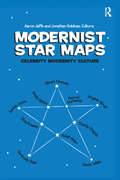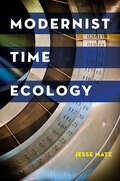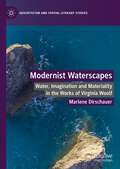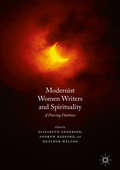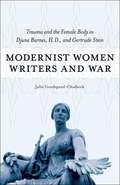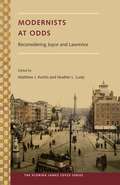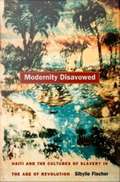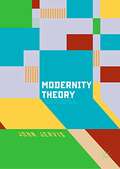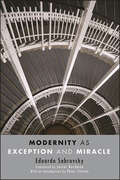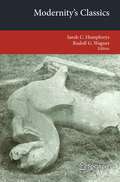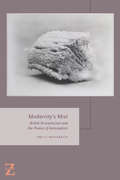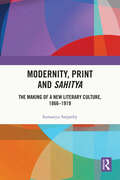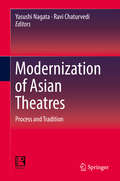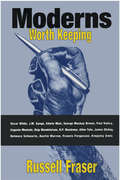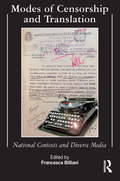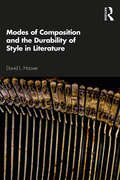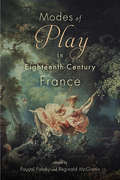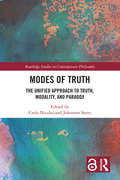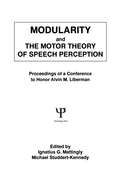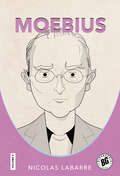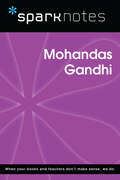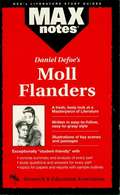- Table View
- List View
Modernist Star Maps: Celebrity, Modernity, Culture
by Aaron Jaffe and Jonathan GoldmanBringing together Canadian, American, and British scholars, this volume explores the relationship between modernism and modern celebrity culture. In support of the collection's overriding thesis that modern celebrity and modernism are mutually determining phenomena, the contributors take on a range of transatlantic canonical and noncanonical figures, from the expected (Virginia Woolf and F. Scott Fitzgerald) to the surprising (Elvis and Hitler). Illuminating case studies are balanced by the volume's attentiveness to broader issues related to modernist aesthetics, as the contributors consider celebrity in relationship to identity, commodification, print culture, personality, visual cultures, and theatricality. As the first book to read modernism and celebrity in the context of the crises of individual agency occasioned by the emergence of mass-mediated culture, Modernist Star Maps argues that the relationship between modernism and the popular is unthinkable without celebrity. Moreover, celebrity's strange evolution during the twentieth century is unimaginable without the intercession of modernism's system of cultural value. This innovative collection opens new avenues for understanding celebrity not only for modernist scholars but for critical theorists and cultural studies scholars.
Modernist Time Ecology (Hopkins Studies in Modernism)
by Jesse MatzA new view of the way modernist fiction writers tried to solve the problem of time.Do our fictions transform time? Do they cultivate the temporal environment? Such was the hope—or the fantasy—at work in many modernist novels for which time was not only the major subject but also an object of reparative aspiration. Aimed at a kind of stewardship of time, these fictions constitute a practice of modernist time ecology: an effort to restore those landscapes of time that have been thrown into crisis by modernity. In Modernist Time Ecology, Jesse Matz redefines temporal experimentation in central writers like Proust, Mann, Woolf, Ellison, and Cather, who developed literary forms to cultivate, restore, and enrich the temporal environment. He brings fresh attention to others who best exemplify this ecological motive, arguing that E. M. Forster, J. B. Priestley, and V. S. Naipaul are leading figures in this practice of temporal redress. Matz also reveals how contemporary film, social media movements, and public service efforts show what has become of the modernist interest in temporal stewardship. Matz combines an array of disciplines—including narrative theory, sociology, phenomenology, cognitive psychology, film studies, queer theory, and environmental studies—to theorize and explain the rationale and the limits to the idea that time might be subject to textual cultivation. Modernist Time Ecology is a deeply interdisciplinary book that changes what we think literature and the arts can do for the world at large.
Modernist Voyages
by Anna SnaithLondon's literary and cultural scene fostered newly configured forms of feminist anticolonialism during the modernist period. Through their writing in and about the imperial metropolis, colonial women authors not only remapped the city, they also renegotiated the position of women within the empire. This book examines the significance of gender to the interwoven nature of empire and modernism. As transgressive figures of modernity, writers such as Jean Rhys, Katherine Mansfield, Una Marson and Sarojini Naidu brought their own versions of modernity to the capital, revealing the complex ways in which colonial identities 'traveled' to London at the turn of the twentieth century. Anna Snaith's timely and original study provides a new vantage point on the urban metropolis and its artistic communities for scholars and students of literary modernism, gender and postcolonial studies, and English literature more broadly.
Modernist Waterscapes: Water, Imagination and Materiality in the Works of Virginia Woolf (Geocriticism and Spatial Literary Studies)
by Marlene DirschauerThis book identifies water as the key element of Virginia Woolf’s modernist poetics. The various forms, movements, and properties of water inspired Woolf’s writing of reality, time, and bodies and offered her an apt medium to reflect on the possibilities as well as on the exhaustion of her art. As a deeply intertextual writer, Woolf recognised how profoundly water has shaped human imagination and the landscape of the literary past. In line with recent ecocritical and ecofeminist assessments of her works, this book also shows Woolf’s attraction to water as part of an indifferent nature that exists prior to and beyond the symbolic. Through close analyses that span the whole of Woolf’s oeuvre, and that centre on the metaphorical and the material voices of water in her works, Modernist Waterscapes offers a fresh perspective on a writing that is as versatile as the element from which it draws. The monograph addresses postgraduate students and scholars working in modernist studies and Woolf studies in particular.
Modernist Women Writers and Spirituality
by Elizabeth Anderson Andrew Radford Heather WaltonConcentrating on female modernists specifically, this volume examines spiritual issues and their connections to gender during the modernist period. Scholarly inquiry surrounding women writers and their relation to what Wassily Kandinsky famously hoped would be an 'Epoch of the Great Spiritual' has generated myriad contexts for closer analysis including: feminist theology, literary and religious history, psychoanalysis, queer and trauma theory. This book considers canonical authors such as Virginia Woolf while also attending to critically overlooked or poorly understood figures such as H. D. , Mary Butts, Rose Macaulay, Evelyn Underhill, Christopher St. John and Dion Fortune. With wide-ranging topics such as the formally innovative poetry of Stevie Smith and Hope Mirrlees to Evelyn Underhill's mystical treatises and correspondence, this collection of essays aims to grant voices to the mostly forgotten female voices of the modernist period, showing how spirituality played a vital role in their lives and writing.
Modernist Women Writers and War: Trauma and the Female Body in Djuna Barnes, H.D., and Gertrude Stein (Southern Literary Studies)
by Julie Goodspeed-ChadwickIn Modernist Women Writers and War, Julie Goodspeed-Chadwick examines important avant-garde writings by three American women authors and shows that during World Wars I and II a new kind of war literature emerged -- one in which feminist investigation of war and trauma effectively counters the paradigmatic war experience long narrated by men. In the past, Goodspeed-Chadwick explains, scholars have not considered writings by women as part of war literature. They have limited "war writing" to works by men, such as William Butler Yeats's poem "An Irish Airman Foresees His Death" (1919), which relies on a male perspective: a pilot contemplates his forthcoming flight, his duty to his country, and his life in combat. But works by Djuna Barnes, H.D., and Gertrude Stein set in wartime reveal experiences and views of war markedly different from those of male writers. They write women and their bodies into their texts, thus creating space for female war writing, insisting on female presence in wartime, and, perhaps most significantly, critiquing war and patriarchal politics, often in devastating fashion. Goodspeed-Chadwick begins with Barnes, who in her surrealist novel Nightwood (1936) emphasizes the actual perversity of war by placing it in contrast to the purported perverse and deviant behavior of her main characters. In her epic poem Trilogy (1944--1946), H.D. validates female suffering and projects a feminist, spiritual worldview that fosters healing from the ravages of war. Stein, for her part, in her experimental novel Mrs. Reynolds (1952) and her long love poem Lifting Belly (1953), captures her experience of the everyday reality of war on the home front, within the domestic economy of her household. In these works, the female body stands as the primary textual marker or symbol of female identity -- an insistence on women's presence in both the text and in the world outside the book. The strategies employed by Barnes, H.D., and Stein in these texts serve to produce a new kind of writing, Goodspeed-Chadwick reveals, one that ineluctably constructs a female identity within, and authorship of, the war narrative.
Modernists at Odds: Reconsidering Joyce and Lawrence (The Florida James Joyce Series)
by Matthew J. Kochis, Heather L. Lusty"Challenges the unhelpful polarization of Lawrence and Joyce in much twentieth-century literary criticism and offers intriguing alternatives to what is surely a reductive approach to the achievements of both writers."—Fiona Becket, author of The Complete Critical Guide to D. H. Lawrence"A groundbreaking collection. Sexuality, censorship, publishing, and rivalry are all treated with a fresh eye; cutting-edge archival research is brought to the fore; and new perspectives such as ecocriticism are among the many highlights."—Susan Mooney, author of The Artistic Censoring of SexualityModernism’s most contentious rivals, James Joyce and D. H. Lawrence, were polar opposites—stylistically, personally, and professionally—yet their lives, works, and careers bear striking similarities. They shared the same literary agent, published in the same literary magazines, fought legal battles against censorship, and were both pirated by Samuel Roth. This is the first book to explore the resonances between the two writers, shattering the historical silence between Joyceans and Lawrentians.The parallels run deep between these epic figures of the literary canon, and this volume explores the classic modernist paradoxes shared by the two writers. Both were at once syncretists and shatterers, bourgeois cosmopolitans, prudish libertines, displaced nostalgists, and rebels against their native lands. Considering mutual themes such as gender, class, horseracing, nature, religion, exile, and modernism’s fascination with Egyptology, these essays highlight the many intersections in the major novels and short fiction of Joyce and Lawrence. Modernists at Odds is a long overdue extended comparison of two of the most compelling writers of the twentieth century.A volume in the Florida James Joyce Series, edited by Sebastian D. G. Knowles Contributors Enda Duffy | Earl G. Ingersoll | Louise Kane | Matthew J. Kochis | Eleni Loukopoulou | Heather L. Lusty | Carl F. Miller | Jennifer Mitchell | Margot Norris
Modernity Disavowed: Haiti and the Cultures of Slavery in the Age of Revolution
by Sibylle FischerModernity Disavowed is a pathbreaking study of the cultural, political, and philosophical significance of the Haitian Revolution (1791-1804). Revealing how the radical antislavery politics of this seminal event have been suppressed and ignored in historical and cultural records over the past two hundred years, Sibylle Fischer contends that revolutionary antislavery and its subsequent disavowal are central to the formation and understanding of Western modernity. She develops a powerful argument that the denial of revolutionary antislavery eventually became a crucial ingredient in a range of hegemonic thought, including Creole nationalism in the Caribbean and G. W. F. Hegel's master-slave dialectic. Fischer draws on history, literary scholarship, political theory, philosophy, and psychoanalytic theory to examine a range of material, including Haitian political and legal documents and nineteenth-century Cuban and Dominican literature and art. She demonstrates that at a time when racial taxonomies were beginning to mutate into scientific racism and racist biology, the Haitian revolutionaries recognized the question of race as political. Yet, as the cultural records of neighboring Cuba and the Dominican Republic show, the story of the Haitian Revolution has been told as one outside politics and beyond human language, as a tale of barbarism and unspeakable violence. From the time of the revolution onward, the story has been confined to the margins of history: to rumors, oral histories, and confidential letters. Fischer maintains that without accounting for revolutionary antislavery and its subsequent disavowal, Western modernity--including its hierarchy of values, depoliticization of social goals having to do with racial differences, and privileging of claims of national sovereignty--cannot be fully understood.
Modernity Theory: Modern Experience, Modernist Consciousness, Reflexive Thinking
by John JervisModernity theory approaches modern experience as it incorporates a sense of itself as ‘modern’ (modernity), along with the possibilities and limitations of representing this in the arts and culture generally (modernism). The book interrogates modernity in the name of a fluid, unsettled, unsettling modernism. <P><P>As the offspring of the Enlightenment and the Age of Sensibility, modernity is framed here through a cultural aesthetics that highlights not just an instrumental, exploitative approach to the world but the distinctive configuration of embodiment, feeling, and imagination, that we refer to as ‘civilization’, in turn both explored and subverted through modernist experimentalism and reflexive thinking in culture and the arts. This discloses the rationalizing pretensions that underlie the modern project and have resulted in the sensationalist, melodramatic conflicts of good and evil that traverse our contemporary world of politics and popular culture alike. This innovative approach permits modernity theory to link otherwise fragmented insights of separate humanities disciplines, aspects of sociology, and cultural studies, by identifying and contributing to a central strand of modern thought running from Kant through Benjamin to the present. One aspect of modernity theory that results is that it cannot escape the paradoxes inherent in reflexive involvement in its own history.
Modernity as Exception and Miracle (SUNY series, Intersections: Philosophy and Critical Theory)
by Eduardo SabrovskyTranslated from the Spanish De lo extraordinario: Nominalismo y Modernidad, this book argues that a defining aspect of modernity is an ever-increasing pursuit of, and need for, what Eduardo Sabrovsky calls "the extraordinary," a term that encompasses both the exception and the miraculous. Sabrovsky shows the degree to which Robert Musil's novel The Man without Qualities functions as a paradoxical paradigm of the extraordinary, and he extends the theoretical insights drawn from Musil's magisterial work through a series of inquiries into cardinal elements of modern literature, material culture, historiography, physical science, psychoanalysis, and political theory. Sabrovsky demonstrates how the extraordinary condition of modernity emerges from the debates conducted by the last representatives of medieval scholasticism in which nominalism defeated realism, and he resituates the results of this triumph of nominalism in the writings of Friedrich Nietzsche, Theodor Adorno, Walter Benjamin, and Georges Bataille, among others.
Modernity's Classics
by Rudolf G Wagner Sarah C. HumphreysThis book presents critical studies of modern reconfigurations of conceptions of the past, of the 'classical', and of national heritage. Its scope is global (China, India, Egypt, Iran, Judaism, the Greco-Roman world) and inter-disciplinary (textual philology, history of art and architecture, philosophy, gardening). Its emphasis is on the complexity of the modernization process and of reactions to it: ideas and technologies travelled from India to Iran and from Japan to China, while reactions show tensions between museumization and the recreation of 'presence'. It challenges readers to rethink the assumptions of the disciplines in which they were trained
Modernity's Mist: British Romanticism and the Poetics of Anticipation (Lit Z)
by Emily RohrbachModernity’s Mist explores an understudied aspect of Romanticism: its future-oriented poetics. Whereas Romanticism is well known for its relation to the past, Emily Rohrbach situates Romantic epistemological uncertainties in relation to historiographical debates that opened up a radically unpredictable and fast- approaching future. As the rise of periodization made the project of defining the “spirit of the age” increasingly urgent, the changing sense of futurity rendered the historical dimensions of the present deeply elusive. While historicist critics often are interested in what Romantic writers and their readers would have known, Rohrbach draws attention to moments when these writers felt they could not know the historical dimensions of their own age. Illuminating the poetic strategies Keats, Austen, Byron, and Hazlitt used to convey that sense of mystery, Rohrbach describes a poetic grammar of future anteriority—of uncertainty concerning what will have been. Romantic writers, she shows, do not simply reflect the history of their time; their works make imaginable a new way of thinking the historical present when faced with the temporalities of modernity.
Modernity, Print and Sahitya: The Making of a New Literary Culture, 1866-1919
by Sumanyu SatpathyThe advent of print heralded a significant chapter in the history of colonial modernity in South Asia. This book narrates the story of the emergence of a new literary culture, Utkal sahitya or Odia literature, in the context of similar but conflicting linguistic-territorial cultures of Eastern India. The book is the first cross-cultural study of the emergence of a new literary culture in Eastern India with diverse, yet cognate languages in the years between 1866 and 1919. By researching a large corpus of archival material, it traces the emergence of a new literary culture that marked significant departures from traditional practices and understanding of the “literary,” and that was subsequently called, adhunik sahitya and argues that this was facilitated mainly by the formation of a public sphere in tandem with the rapid growth of educated print-public. While the phenomenon was by no means unique to Odia, the study identifies several local factors that were distinctive about its literary sphere by looking at its imbrication with sister linguistic cultures. It traces how, under political compulsions, a new intellectual class of Odias used agents of modernity such as print, education, new sciences, travel and communication etc. to forge a new aesthetic without completely breaking with the past. It examines the role that the Odia periodical press played, and traces the course it took from the time of its emergence from local political compulsions to the defining and broadening of the scope and limits of the question of the literary. It investigates the shifting and mutating dispositions of the newly emerged Odia print culture and public sphere while highlighting major concerns such as linguistic identity, historiography, literary histories, and canon formation as well as pioneering and consolidating new aesthetic forms. This book will be an important addition to the growing body of scholarship on literary cultures of multilingual India. Rich in archival work, this book will be of interest to students and researchers of literary history, cultural history, cultural studies, literature, literary history, literary and critical theory, and languages of Asia.
Modernization of Asian Theatres: Process and Tradition
by Yasushi Nagata Ravi ChaturvediThis volume focuses on the theatre history of Asian countries, and discusses the specific context of theatre modernization in Asia. While Asian theatre is one of the primary interests within theatre scholarship in the world today, knowledge of Asian theatre history is very limited and often surprisingly incorrect. Therefore, this volume addresses a major gap in contemporary theatre studies. The volume discusses the conflict between tradition and modernity in theatre, suggesting that the problems of modernity are closely related to the idea of tradition. Although Asian countries preserved the traditional form and values of their respective theatres, they had to also confront the newly introduced values or mechanisms of European modernity. Several papers in this volume therefore provide critical surveys of the history of theatre modernization in Asian countries or regions—Japan, Korea, Taiwan, Hong Kong, India Malaysia, Singapore, and Uyghur. Other papers focus on specific case studies of the history of modernization, discussing contemporary Taiwanese performances, translations of modern French comedy into Chinese, the modernization of Chinese Xiqu, modern Okinawan plays, Malaysian traditional performances, Korean national theatre, and Japanese plays during World War II. Renowned academics and theatre critics have contributed to this volume, making it a valuable resource for researchers and students of theatre studies, literature, and cultural studies.
Moderns Worth Keeping
by Russell FraserIn this new volume, Russell Fraser assembles fourteen twentieth-century writers he judges "worth keeping." All were famous in their time, but many outlived it, enduring an eclipse that Fraser intends this book to dispel. Each of the authors differs in background and in the kinds of writing practiced, and while together they do not constitute a modern canon, Fraser persuasively presents them as a group distinguished by a more than ordinary affiliation for language. Leading off are Oscar Wilde and J. M. Synge, both of whom were Irish and principally known as playwrights. The Scottish poets Edwin Muir and G.M. Brown are complemented by three great Europeans: Paul Valery, Eugenio Montale, and Osip Mandelstam, "mandarins" who wrote for an elite of their time, not a social elite, but readers who could read. The New Critics, who gave language first place in their writing, loom large in this account. R.P. Blackmur and Allen Tate are followed by Delmore Schwartz, Austin Warren, and Francis Fergusson, lesser stars orbiting those greater than themselves. Kingsley Amis the novelist and James Dickey the poet, with whom the book concludes, had a great run at fame and fortune, but ended bleakly. The world was livelier for these writers' presence, and what they left us still gives satisfaction. This heterogeneous group may be said to be our saving remnant. In a time of coarsened feeling, its members possess in high degree the ability to discriminate, seeing acutely, and inspiring feeling where it was dead. Their function is therapeutic, even restorative for the life of letters. To give them a hearing is the principal purpose of the book.
Modes of Censorship: National Contexts and Diverse Media
by Francesca BillianiModes of Censorship and Translation articulates a variety of scholarly and disciplinary perspectives and offers the reader access to the widening cultural debate on translation and censorship, including cross-national forms of cultural fertilization. It is a study of censorship and its patterns of operation across a range of disciplinary settings, from media to cultural and literary studies, engaging with often neglected genres and media such as radio, cinema and theatre. Adopting an interdisciplinary and transnational approach and bringing together contributions based on primary research which often draws on unpublished archival material, the volume analyzes the multi-faceted relationship between censorship and translation in different national contexts, including Italy, Spain, Great Britain, Greece, Nazi Germany and the GDR, focusing on the political, ideological and aesthetic implications of censorship, as well as the hermeneutic play fostered by any translational act. By offering innovative methodological interpretations and stimulating case studies, it proposes new readings of the operational modes of both censorship and translation. The essays gathered here challenge current notions of the accessibility of culture, whether in overtly ideological and politically repressive contexts, or in seemingly 'neutral' cultural scenarios.
Modes of Composition and the Durability of Style in Literature
by David L. HooverModes of Composition and the Durability of Style employs the tools and methods of computational stylistics to show that style is extremely resistant to changes in how texts are produced. Addressing an array of canonical writers, including William Faulkner, Joseph Conrad, Thomas Hardy, and Henry James, along with popular contemporary writers like Stephen King and Ian McEwan, this volume presents a systematic study of changes in mode of composition and writing technologies. Computational analysis of texts produced in multiple circumstances of composition, such as dictation, handwriting, typewriting, word processing, and translation, reveals the extraordinary durability of authorial style. Modes of Composition and the Durability of Style in Literature will be essential for readers interested in exploring the rapidly expanding field of digital approaches to literature.
Modes of Play in Eighteenth-Century France (Scènes francophones: Studies in French and Francophone Theater)
by Yann Robert Rori Bloom Jean-Alexandre Perras Zeina Hakim Masano Yamashita Erika Mandarino Katharine Hargrave Maria Teodora Comsa Annelle Curulla Jeffrey M. LeichmanCollecting diverse critical perspectives on the topic of play—from dolls, bilboquets, and lotteries, to writing itself—this volume offers new insights into how play was used to represent and reimagine the world in eighteenth-century France. In documenting various modes of play, contributors theorize its relation to law, religion, politics, and economics. Equally important was the role of “play” in plays, and the function of theatrical performance in mirroring, and often contesting, our place in the universe. These essays remind us that the spirit of play was very much alive during the “Age of Reason,” providing ways for its practitioners to consider more “serious” themes such as free will and determinism, illusions and equivocations, or chance and inequality. Standing at the intersection of multiple intellectual avenues, this is the first comprehensive study in English devoted to the different guises of play in Enlightenment France, certain to interest curious readers across disciplinary backgrounds.
Modes of Truth: The Unified Approach to Truth, Modality, and Paradox (Routledge Studies in Contemporary Philosophy)
by Carlo Nicolai; Johannes SternThe aim of this volume is to open up new perspectives and to raise new research questions about a unified approach to truth, modalities, and propositional attitudes. The volume’s essays are grouped thematically around different research questions. The first theme concerns the tension between the theoretical role of the truth predicate in semantics and its expressive function in language. The second theme of the volume concerns the interaction of truth with modal and doxastic notions. The third theme covers higher-order solutions to the semantic and modal paradoxes, providing an alternative to first-order solutions embraced in the first two themes. This book will be of interest to researchers working in epistemology, logic, philosophy of logic, philosophy of language, philosophy of mathematics, and semantics.
Modification
by Marcin MorzyckiModifiers and modification have been a major focus of inquiry for as long as the formal study of semantics has existed, and remain at the heart of major theoretical debates in the field. Modification offers comprehensive coverage of a wide range of topics, including vagueness and gradability, comparatives and degree constructions, the lexical semantics of adjectives and adverbs, crosscategorial regularities, and the relation between meaning and syntactic category. Morzycki guides the reader through the varied and sometimes mysterious phenomena surrounding modification and the ideas that have been proposed to account for them. Presenting disparate approaches in a consistent analytical framework, this accessibly written work, which includes an extensive glossary of technical terms, is essential reading for researchers and students of all levels in linguistics, the philosophy of language and psycholinguistics.
Modularity and the Motor theory of Speech Perception: Proceedings of A Conference To Honor Alvin M. Liberman
by Michael Studdert-Kennedy Ignatius G. MattinglyA compilation of the proceedings of a conference held to honor Alvin M. Liberman for his outstanding contributions to research in speech perception, this volume deals with two closely related and controversial proposals for which Liberman and his colleagues at Haskins Laboratories have argued forcefully over the past 35 years. The first is that articulatory gestures are the units not only of speech production but also of speech perception; the second is that speech production and perception are not cognitive processes, but rather functions of a special mechanism. This book explores the implications of these proposals not only for speech production and speech perception, but for the neurophysiology of language, language acquisition, higher-level linguistic processing, the visual perception of phonetic gestures, the production and perception of sign language, the reading process, and learning to read. The contributors to this volume include linguists, psycholinguists, speech scientists, neurophysiologists, and ethologists. Liberman himself responds in the final chapter.
Moebius (Biographix)
by Nicolas LabarreJean Giraud (1938–2012) started drawing comics in the late 1950s for a variety of French comics magazines. Under his real name, he found success in 1963 with the western series Blueberry, written by Jean-Michel Charlier and published in Pilote magazine. In the 1970s, he started producing science fiction works under the name of Moebius, which brought him international success, and which included works such as Arzach. He died in 2012 as a global celebrity in the comics world and a major influence across visual media. This first book-length, English-language study of Moebius finally brings international attention to an artist whose influence on the medium was profound and immediate, making him a role model for aspiring comics creators throughout his career. He was widely imitated while at Métal Hurlant in the 1970s, was “prominent among the spiritual fathers of the comic book rebels” in the 1990s, and again an example for the independent artists identified as the “new bande dessinée” in France in the early 2000s. Featuring close readings of key texts, including Blueberry, The Airtight Garage of Jerry Cornelius, and “The Long Tomorrow,” this volume examines Moebius’s style and aesthetic achievement. Notably, the volume explores the tension between Giraud and Moebius—one name for westerns, the other for science fiction; one name for the domestic market, another as a global brand; one name for the brush, another for the pen; one for the mainstream and the other for the underground. Nicolas Labarre challenges those dichotomies, especially in the later phases of Moebius’s career, unveiling the complex evolution of this understudied but influential artist.
Mohandas Gandhi (SparkNotes Biography Guide)
by SparkNotesMohandas Gandhi (SparkNotes Biography Guide) Making the reading experience fun! SparkNotes Biography Guides examine the lives of historical luminaries, from Alexander the Great to Virginia Woolf. Each biography guide includes:An examination of the historical context in which the person lived A summary of the person&’s life and achievements A glossary of important terms, people, and events An in-depth look at the key epochs in the person&’s career Study questions and essay topics A review test Suggestions for further reading Whether you&’re a student of history or just a student cramming for a history exam, SparkNotes Biography guides are a reliable, thorough, and readable resource.
Moll Flanders (MAXNotes Literature Guides)
by Susan GallagherREA's MAXnotes for Daniel Defoe's Moll Flanders MAXnotes offer a fresh look at masterpieces of literature, presented in a lively and interesting fashion. Written by literary experts who currently teach the subject, MAXnotes will enhance your understanding and enjoyment of the work. MAXnotes are designed to stimulate independent thought about the literary work by raising various issues and thought-provoking ideas and questions. MAXnotes cover the essentials of what one should know about each work, including an overall summary, character lists, an explanation and discussion of the plot, the work's historical context, illustrations to convey the mood of the work, and a biography of the author. Each chapter is individually summarized and analyzed, and has study questions and answers.
